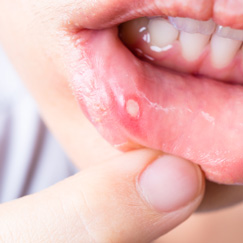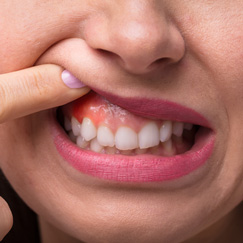These are things to look out for:













During a self-examination look at the skin on the face and neck to check for:



That’s quite a list but remember the mouth is prone to all sorts of damage. We bite ourselves, burn ourselves with hot food and drink and damage the inside of our mouths with spicy foods or scrape it with hard things. Bleeding gums and loose teeth are commonly caused by gum disease. Many people are prone to mouth ulcers (never lasting more than 3 weeks).
Skin conditions like lichen planus can cause ulceration, changes to texture and white patches and infection with thrush and other microorganisms are common. Most dentures become loose simply because they are old. Pain in the mouth is often due to toothache or abscesses. The chances of the signs and symptoms above being due to cancer are low but we all know our own bodies’ best so if you have ANY SUSPICION THAT SOMETHING MAY BE WRONG contact your dentist or doctor IMMEDIATELY.

In the mouth there may also be:
Many of the symptoms listed above will have innocent causes but it is wise to get them checked out by a medical professional.
As in Mouth Cancer, men are more likely to be affected than women. Similarly the risk of nasal cavity and sinus cancer increases with age with about 65% of cases occurring in people over 55. The use of tobacco and exposure to certain strains of the Human Papilloma Virus (HPV) are other shared risk factors.
In addition, people following certain occupations in dusty environments are also at greater risk. These include:
Despite these risk factors many people are diagnosed with the disease without obvious causes being apparent.
Treatment for Nasal Cavity and Paranasal Sinus cancer may involve surgery, radiotherapy and/or chemotherapy. These treatments have numerous side-effects, again similar to the after-effects experienced by Mouth Cancer survivors.
If you have noticed any of the signs and symptoms described on this website or have any other reason to believe you may have mouth or other head and neck cancer you should CONTACT YOUR DENTIST OR DOCTOR WITHOUT DELAY.
A professional examination will decide whether further action needs to be taken. In many cases you will be asked to return to the dentist or doctor for a review of your symptoms in 2-3 weeks.
Sometimes the clinician will need a second opinion and may refer you to specialists at a local hospital. This does not mean you have mouth cancer. In fact less than 10% of patients referred turn out to have serious conditions. The referral is simply to protect your interests and make sure you get the best, most thorough and fastest treatment.
The earlier cancer is diagnosed the easier it is to treat. That is why every adult should examine themselves at least once a month for lumps or changes in the skin and mouth even when there is no discomfort. See our Self Examination for more information.

Download a variety of free leaflets, posters and educational resources.